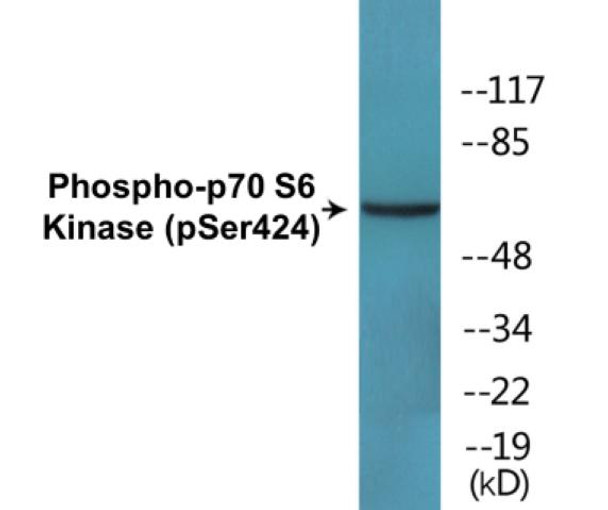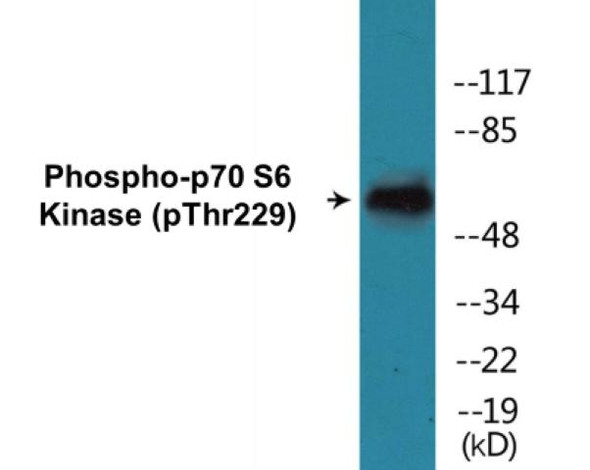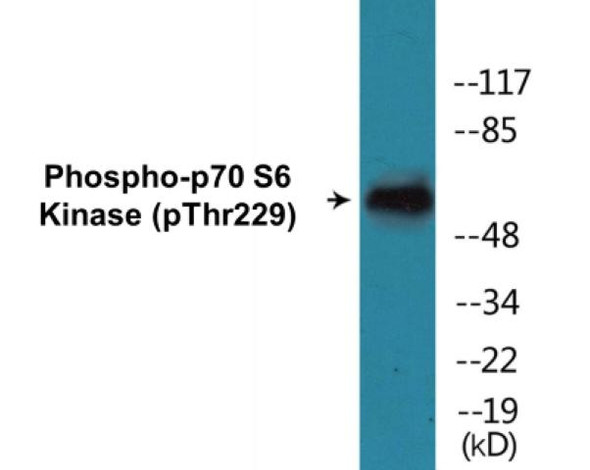Description
p70 S6 Kinase (Phospho-Ser424) Cell-Based ELISA Kit
The p70 S6 Kinase (Phospho-Ser424) Cell-Based ELISA Kit is a convenient, lysate- free, high throughput and sensitive assay kit that can monitor p70 S6 Kinase phosphorylation and expression profile in cells. The kit can be used for measuring the relative amounts of phosphorylated p70 S6 Kinase in cultured cells as well as screening for the effects that various treatments, inhibitors (ie. siRNA or chemicals), or activators have on p70 S6 Kinase phosphorylation.
How does our p70 S6 Kinase (Phospho-Ser424) Fluorometric Cell-Based ELISA Kit work?
Qualitative determination of p70 S6 Kinase (Phospho-Ser424) concentration is achieved by an indirect ELISA format. In essence, p70 S6 Kinase (Phospho-Ser424) is captured by p70 S6 Kinase (Phospho-Ser424)-specific primary (1°) antibodies while Dye 1-conjugated and Dye 2-conjugated secondary (2°) antibodies bind the Fc region of the 1° antibody. Through this binding, the dye conjugated to the 2° antibody can emit light at a certain wavelength given proper excitation, hence allowing for a fluorometric detection method. Due to the qualitative nature of the Cell-Based ELISA, multiple normalization methods are needed:
| 1. | A monoclonal antibody specific for human GAPDH is included to serve as an internal positive control in normalizing the target RFU values. |
| 2. | An antibody against the nonphosphorylated counterpart of p70 S6 Kinase (Phospho-Ser424) is also provided for normalization purposes. The RFU values obtained for non-phosphorylated p70 S6 Kinase can be used to normalize the RFU value for phosphorylated p70 S6 Kinase. |
p70 S6 Kinase (Phospho-Ser424) Fluorometric Cell-Based ELISA Kit -Information
| Product Name: | p70 S6 Kinase (Phospho-Ser424) Fluorometric Cell-Based ELISA Kit |
| Product Code/SKU: | FBCAB00078 |
| Description: | The p70 S6 Kinase (Phospho-Ser424) Fluorometric Cell-Based Phospho ELISA Kit is a convenient, lysate-free, high throughput and sensitive assay kit that can monitor p70 S6 Kinase (Phospho-Ser424) protein phosphorylation and expression profile in cells. The kit can be used for measuring the relative amounts of phosphorylated p70 S6 Kinase (Phospho-Ser424) in cultured cells as well as screening for the effects that various treatments, inhibitors (ie. siRNA or chemicals, or activators have on RPS6KB1 phosphorylation. |
| Dynamic Range: | > 5000 Cells |
| Detection Method: | Fluorometric |
| Storage/Stability: | 4°C/6 Months |
| Reactivity: | Human, Mouse, Rat |
| Assay Type: | Cell-Based ELISA |
| Database Links: | Gene ID: 6198, UniProt ID: P23443, OMIM #: 608938, Unigene #: Hs.463642 |
| Format: | Two 96-Well Plates |
| NCBI Gene Symbol: | RPS6KB1 |
| Sub Type: | Phospho |
| Target Name: | Phospho-p70 S6 Kinase (Ser424) |
Kit Principle
Figure: Schematic representation of Assay Genie Cell-Based Fluorometric ELISA principle
Kit components | Quantity |
| 96-Well Black Cell CultureClear-Bottom Microplate | 2 plates |
| 10X TBS | 24 ml |
| Quenching Buffer | 24 ml |
| Blocking Buffer | 50 ml |
| 15X Wash Buffer | 50 ml |
| Primary Antibody Diluent | 12 ml |
| 100x Anti-Phospho Target Antibody | 60 µl |
| 100x Anti-Target Antibody | 60 µl |
| Anti-GAPDH Antibody | 110 µl |
| Dye-1 Conjugated Anti-Rabbit IgG Antibody | 6 ml |
| Dye-2 Conjugated Anti-Mouse IgG Antibody | 6 ml |
| Adhesive Plate Seals | 2 seals |
Additional equipment and materials required
The following materials and/or equipment are NOT provided in this kit but are necessary to successfully conduct the experiment:
- Fluorescent plate reader with two channels at Ex/Em: 651/667 and 495/521
- Micropipettes capable of measuring volumes from 1 µl to 1 ml
- Deionized or sterile water (ddH2O)
- 37% formaldehyde (Sigma Cat# F-8775) or formaldehyde from other sources
- Squirt bottle, manifold dispenser, multichannel pipette reservoir or automated microplate washer
- Graph paper or computer software capable of generating or displaying logarithmic functions
- Absorbent papers or vacuum aspirator
- Test tubes or microfuge tubes capable of storing ≥1 ml
- Poly-L-Lysine (Sigma Cat# P4832 for suspension cells)
- Orbital shaker (optional)
Kit Protocol
This is a summarized version of the kit protocol. Please view the technical manual of this kit for information on sample preparation, reagent preparation and plate lay out.
| 1. | Seed 200 µl of desired cell concentration in culture medium into each well of the 96-well plates. For suspension cells and loosely attached cells, coat the plates with 100 µl of 10 µg/ml Poly-L-Lysine (not included) to each well of a 96-well plate for 30 minutes at 37°C prior to adding cells. |
| 2. | Incubate the cells for overnight at 37°C, 5% CO2. |
| 3. | Treat the cells as desired. |
| 4. | Remove the cell culture medium and rinse with 200 µl of 1x TBS, twice. |
| 5. | Fix the cells by incubating with 100 µl of Fixing Solution for 20 minutes at room temperature. The 4% formaldehyde is used for adherent cells and 8% formaldehyde is used for suspension cells and loosely attached cells. |
| 6. | Remove the Fixing Solution and wash the plate 3 times with 200 µl 1x Wash Buffer for 3 minutes. The plate can be stored at 4°C for a week. |
| 7. | Add 100 µl of Quenching Buffer and incubate for 20 minutes at room temperature. |
| 8. | Wash the plate 3 times with 1x Wash Buffer for 3 minutes each time. |
| 9. | Dispense 200 µl of Blocking Buffer and incubate for 1 hour at room temperature. |
| 10. | Wash 3 times with 200 µl of 1x Wash Buffer for 3 minutes each time. |
| 11. | Add 50 µl of Primary Antibody Mixture P to corresponding wells for p70 S6 Kinase (Phospho-Ser424) detection. Add 50 µl of Primary Antibody Mixture NP to the corresponding wells for total p70 S6 Kinase detection. Cover the plate with parafilm and incubate for 16 hours (overnight) at 4°C. If the target expression is known to be high, incubate for 2 hours at room temperature. |
| 12. | Wash 3 times with 200 µl of 1x Wash Buffer for 3 minutes each time. |
| 13. | Add 50 ul of Secondary Antibody Mixture to corresponding wells and incubate for 1.5 hours at room temperature in the dark. |
| 14. | Wash 3 times with 200 µl of 1x Wash Buffer for 3 minutes each time. |
| 15. | Read the plate(s) at Ex/Em: 651/667 (Dye 1) and 495/521 (Dye 2). Shield plates from direct light exposure. |
| 16. | Wash 3 times with 200 µl of 1x Wash Buffer for 5 minutes each time. |
p70 S6 Kinase (Phospho-Ser424) - Protein Information
| UniProt Protein Function: | p70S6K: an AGC kinase of the RSK family that is required for cell growth and G1 cell cycle progression. Is phosphorylated and activated by mTOR in mitogenic pathways downstream of phosphoinositide 3 kinase (PI3K). Phosphorylates the S6 protein of the 40S ribosomal subunit and is involved in translational control of 5' oligopyrimidine tract mRNAs. Activity is controlled by multiple phosphorylation events located within the catalytic, linker and pseudosubstrate domains. Mouse knockout shows symptoms of insulin resistance, and increased insulin senstivity, resulting in protection against diet-induced obesity. Protein expression and activation upregulated in colon adenocarcinoma cell lines. Increased expression in breast cancer correlated with poor survival. Selectively amplified and overexpressed within the 17q23 breast cancer amplicon. Two isoforms produced by alternative initiation have been reported. |
| UniProt Protein Details: | Protein type:EC 2.7.11.1; Translation; Protein kinase, Ser/Thr (non-receptor); Protein kinase, AGC; Kinase, protein; AGC group; RSK family; p70 subfamily Chromosomal Location of Human Ortholog: 17q23.1 |
| NCBI Summary: | This gene encodes a member of the ribosomal S6 kinase family of serine/threonine kinases. The encoded protein responds to mTOR (mammalian target of rapamycin) signaling to promote protein synthesis, cell growth, and cell proliferation. Activity of this gene has been associated with human cancer. Alternatively spliced transcript variants have been observed. The use of alternative translation start sites results in isoforms with longer or shorter N-termini which may differ in their subcellular localizations. There are two pseudogenes for this gene on chromosome 17. [provided by RefSeq, Jan 2013] |
| UniProt Code: | P23443 |
| NCBI GenInfo Identifier: | 54041234 |
| NCBI Gene ID: | 6198 |
| NCBI Accession: | P23443.2 |
| UniProt Secondary Accession: | P23443,Q7Z721, B2R779, B4DLT4, B4DTG1, E7ESB8, F6UYM1 |
| UniProt Related Accession: | P23443 |
| Molecular Weight: | 525 |
| NCBI Full Name: | Ribosomal protein S6 kinase beta-1 |
| NCBI Synonym Full Names: | ribosomal protein S6 kinase, 70kDa, polypeptide 1 |
| NCBI Official Symbol: | RPS6KB1 |
| NCBI Official Synonym Symbols: | S6K; PS6K; S6K1; STK14A; p70-S6K; p70 S6KA; p70-alpha; S6K-beta-1; p70(S6K)-alpha |
| NCBI Protein Information: | ribosomal protein S6 kinase beta-1; p70 S6 kinase, alpha; ribosomal protein S6 kinase I; serine/threonine kinase 14 alpha; serine/threonine-protein kinase 14A |
| UniProt Protein Name: | Ribosomal protein S6 kinase beta-1 |
| UniProt Synonym Protein Names: | 70 kDa ribosomal protein S6 kinase 1; P70S6K1; p70-S6K 1; Ribosomal protein S6 kinase I; Serine/threonine-protein kinase 14A; p70 ribosomal S6 kinase alpha; p70 S6 kinase alpha; p70 S6K-alpha; p70 S6KA |
| Protein Family: | Ribosomal protein S6 kinase |
| UniProt Gene Name: | RPS6KB1 |
| UniProt Entry Name: | KS6B1_HUMAN |







